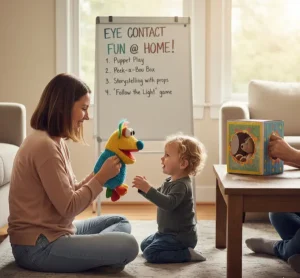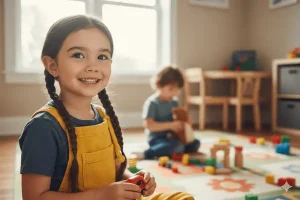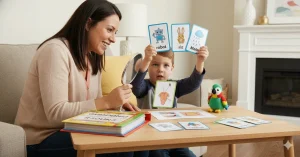Autism Regression: What It Means When a Child Loses Skills
Last Updated: June 5, 2025
As parents, watching your child grow and reach milestones is one of life’s greatest joys. But what happens when a child suddenly starts to lose those hard-earned skills—like speaking, playing, or making eye contact? This unexpected shift can be confusing and concerning, and it may be a sign of autism regression.
This is known as autism regression—a condition where a child begins to lose social, language, or behavioral skills they previously developed. While it can be alarming, understanding what’s happening is the first step to finding the right support.
Book Free Autism Session
Concerned about your child’s development? Talk to our autism expert online for free. Get personalized consultation and expert next steps.
What Is Autism Regression?
Imagine your child has started saying a few words, waving goodbye, or playing peekaboo—and then, over time, those milestones start to fade. If this sounds familiar, you might be seeing signs of autism regression.
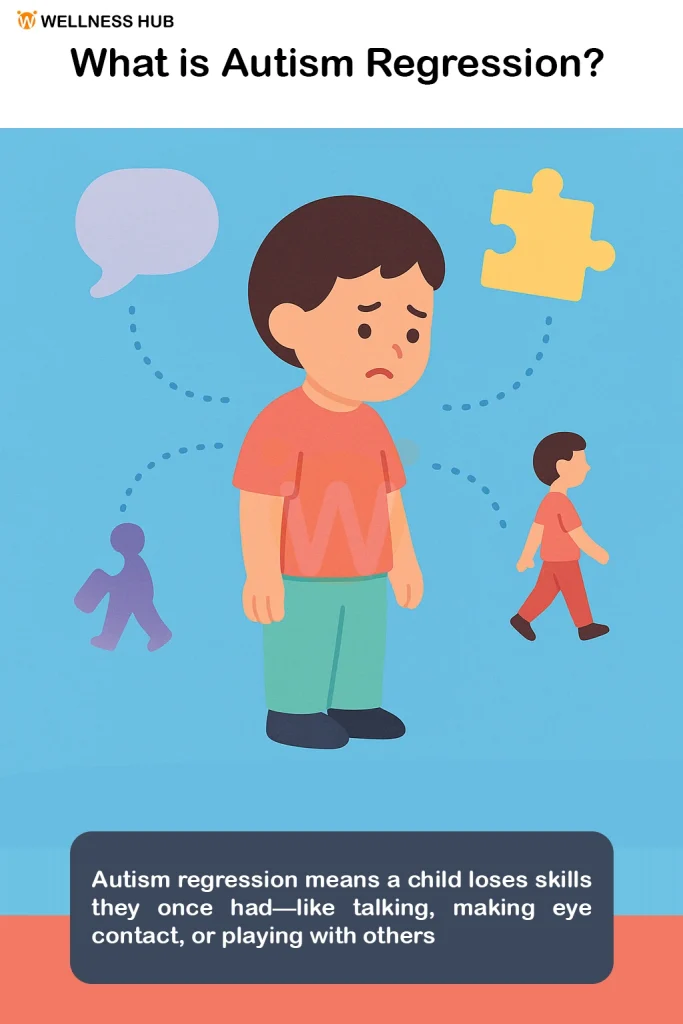
Autism Regression Meaning
Autism regression means a child who was developing certain skills—like speaking, socializing, or even making eye contact—suddenly begins to lose those abilities. It’s not about being late to learn something. It’s about losing skills that were already there.
This can be especially confusing and worrying for parents. One week your toddler might be calling you “mama” or playing with others—and the next, they may stop responding to their name or seem more withdrawn.
Common Skills That May Be Lost
Some of the early skills that might disappear include:
- Speech and words your child previously used
- Eye contact and facial expressions
- Social interaction, like playing with others or showing affection
- Gestures, such as waving or pointing
- Interest in surroundings or favorite toys
When Do Early Signs Start?
Most often, autism regression appears between 15 and 30 months of age. In some cases, the change is very subtle and gradual, while in others, it can feel quite sudden.
Here’s a quick look:
| Age Range | Possible Signs |
|---|---|
| 16–18 months | Stops using new words |
| 20–24 months | Less interest in social play |
| 24–30 months | Avoids eye contact, withdraws socially |
When Does Autism Regression Usually Happen?
One of the most common questions parents ask is, “When does autism regression start?” The truth is, every child is different—but in many cases, regression tends to happen during a key window of early development.
Typical Autism Regression Age
Autism regression usually occurs between 15 and 30 months of age. That’s around the time toddlers are learning to speak, interact with others, and show curiosity about the world around them.
Some children may develop normally at first, hitting early milestones like babbling, using a few words, or playing with others. Then, slowly—or sometimes suddenly—they begin to lose those skills.
Here’s a simple breakdown to help you recognize when certain signs might appear:
| Age | Possible Signs of Autism Regression |
|---|---|
| 18 months | Loss of eye contact, less interest in people |
| 24 months | Stops using words or gestures they knew |
| 30 months | Plays alone more often, avoids social play |
These changes can be subtle or obvious. Some children may stop saying words they used often. Others may become less emotionally responsive, pulling away from interactions they once enjoyed.
What Makes This Time Period So Important?
This age range is crucial for language, social skills, and emotional growth. That’s why any loss of abilities during this time stands out—and it’s also why early action can make a big difference.
Signs of Autism Regression in Toddlers
Spotting the signs of autism regression can be heartbreaking for any parent. It’s especially tough when your child seemed to be developing well—and then, slowly or suddenly, certain skills begin to fade.
Understanding the symptoms of autism regression in toddlers helps you act early, which can make a real difference in your child’s progress.
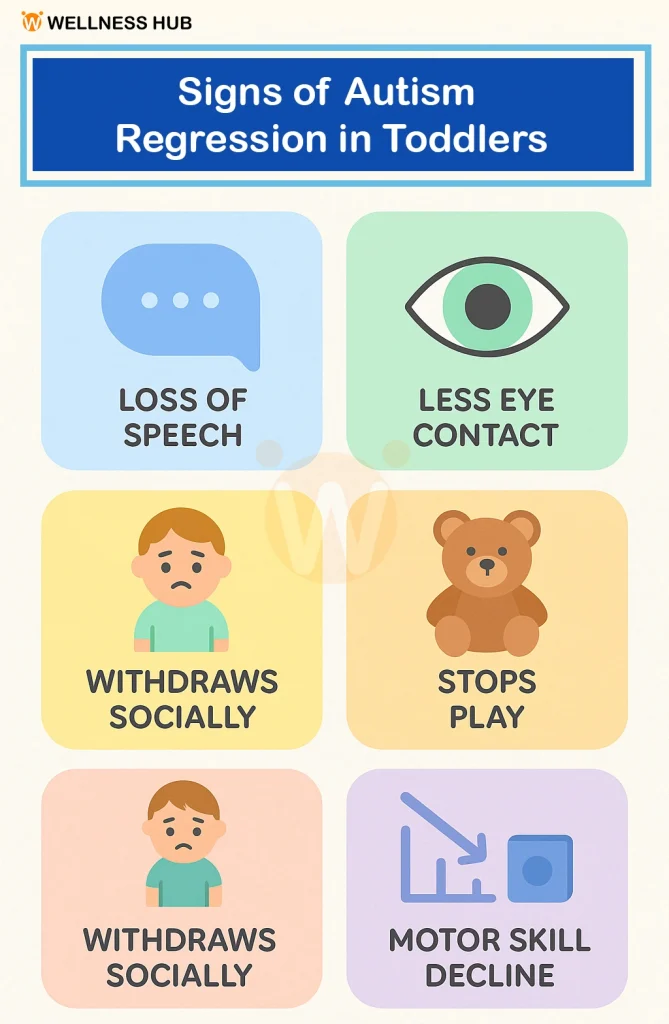
Common Signs to Look Out For:
Here are some typical signs parents often notice during regression:
- Loss of speech or fewer words used
Your child might stop saying words they used to say, or their vocabulary may shrink over time. - Less eye contact or social engagement
They may no longer respond to their name, look you in the eye, or show interest in playing with others. - Stops enjoying favorite play activities
Toys or games that once brought joy may no longer catch their attention. - Withdraws from family or siblings
Some toddlers become quieter, avoid cuddles, or seem to prefer being alone. - Decline in motor or self-help skills
You might notice a step backward in things like using a spoon, pointing to objects, or dressing themselves.
Why Do Some Children With Autism Lose Skills?
If you’ve ever found yourself wondering, “Why do autistic children regress?” — you’re not alone. Many parents go through this confusing and emotional phase, especially when a child who was developing normally suddenly starts to lose speech, social interaction, or motor skills.
Understanding the causes of autism regression can bring clarity and help you take the right next steps.
Possible Causes of Autism Regression
Experts are still studying the exact reasons behind regression, but several key factors are believed to contribute:
1. Genetic Factors
Some children may be born with genetic differences that affect how their brains develop over time. These genetic factors can sometimes lead to a period of normal growth followed by a loss of previously gained skills.
2. Neurological Development
The brain of a child with autism may develop differently—especially in areas related to speech, behavior, and social connection. These neurological differences might not be obvious at birth, but they can show up later as regression.
3. Environmental Stress or Immune Response
In some cases, stressful events, infections, or changes in the child’s environment may play a role. Researchers also believe the immune system might react in a way that impacts the brain’s development—although this is still being explored.
Autism Regression vs. Developmental Delay
It’s natural for parents to feel confused when their child shows signs of delayed growth or loses skills they once had. One of the biggest questions families ask is:
What’s the difference between regression and delay?
Understanding autism regression vs developmental delay helps you know what to look for and when to seek support.
Key Differences Between Regression and Delay
Here’s a simple comparison to make things clearer:
| Aspect | Regression | Delay |
|---|---|---|
| Skills Lost | Yes – child had and then lost skills | No – skills were never developed yet |
| Sudden Change | Often noticeable and sudden | Rare – usually a slow pattern |
| Recovery Possible | Yes – with early support and therapy | Yes – with guidance and consistency |
So, What Does It Mean?
- Developmental delay means a child is taking longer to reach milestones like walking, talking, or socializing—but once they reach those skills, they usually continue progressing.
- Autism regression means a child had those skills and then lost them—especially in areas like language, social interaction, or behavior.
Can Autism Regression Be Reversed?
One of the biggest questions parents ask is: Can autism regression be reversed?
The good news is—yes, with the right support and early action, many children can regain lost skills and continue to grow.
While every child is unique, research and real-life stories show that early therapy can make a huge difference.
The Power of Early Intervention
Early intervention means starting support as soon as you notice signs of skill loss. The earlier you act, the better the outcome tends to be. This is because a child’s brain is still very flexible and responsive to learning in the early years.
Think of early intervention as opening a door just in time—so your child doesn’t miss the chance to re-learn and grow stronger.
Therapies That Help Reverse Regression
Here are some of the most effective therapies used to support children experiencing regression:
Speech Therapy
- Speech therapy helps children regain lost words, improve understanding, and express themselves clearly.
- Therapists use play-based techniques, gestures, and visual aids to reintroduce language naturally.
- It also boosts confidence in communicating with family, peers, and in daily situations.
Occupational Therapy
- Occupational therapy focuses on rebuilding everyday skills like holding a spoon, dressing, or writing.
- Therapists work on improving fine motor coordination, sensory regulation, and attention span.
- It encourages greater independence and smoother transitions through daily routines.
Social Skills Training
- This therapy helps children reconnect socially through structured play and guided interaction.
- It teaches skills like making eye contact, taking turns, sharing, and understanding emotions.
- Group sessions often simulate real-life social settings to build confidence and reduce anxiety.
Read more about our article on Engaging Home-Based Occupational Therapy Activities for Children with Autism
What Parents Can Do to Support Their Child
When your child starts losing skills, it’s natural to feel worried or even helpless. But here’s the truth—your support can make all the difference. If you’re wondering how to help a child with autism regression, there are many simple and effective steps you can take right at home.
You don’t need to do everything at once. Even small, consistent actions from you can create a safe, supportive space for your child to relearn and grow.
Simple Ways Parents Can Support Autism Regression
Let’s break it down into practical things you can start today:
Stick to Consistent Routines
Children with regression often feel more secure when they know what to expect. Keep regular mealtimes, play times, and bedtime routines. A predictable day can reduce stress and build trust.
Encourage Interactive Play
Play is more than fun—it’s learning in disguise. Try games that involve turn-taking, naming objects, or making eye contact. Even a short play session each day helps with attention, bonding, and social skills.
Get Speech Therapy Support
A speech-language therapist can help your child regain lost words or build new ways to communicate. Whether your child is nonverbal or just struggling with language, therapy can open doors.
Use Trusted Tools from Wellness Hub
We offer parent-friendly home therapy resources, printable materials, and expert-designed programs that are easy to use—even if you have no prior experience. These tools are built to help your child learn in a fun, interactive way from the comfort of home.
Remember: Progress Takes Time
Regression doesn’t mean your child is “stuck.” With your encouragement and the right support, they can rebuild their skills—and even discover new ones. You’re not alone in this journey, and every step you take matters.
Know more: At-Home Autism Therapy: Effective Techniques for Parents
Conclusion
If your child is losing speech, eye contact, or social skills, it might feel scary—but autism regression is not the end. Many children regain these skills with early support, patience, and the right therapy. The sooner you act, the better the results. Small steps at home, like consistent routines and simple play, can go a long way. Add expert guidance through speech or occupational therapy, and your child has a strong chance to grow and thrive again. At Wellness Hub, we’re here to support you. From easy home programs to one-on-one expert sessions, everything is designed for real parents like you.
Frequently Asked Questions:
1. What is autism regression in toddlers?
Autism regression is when a toddler who was growing and learning normally suddenly starts to lose important skills. These could be words they used to say, eye contact, play interest, or simple actions like waving or pointing. It usually happens between 15 and 30 months of age and is one of the early signs of autism in some children.
2. At what age does autism regression usually start?
Most cases of autism regression start between 15 and 30 months of age. Some parents notice changes around the time their child should be speaking more or socializing. You might first see your child stop using words they previously learned or begin avoiding interaction with others.
3. What are the signs of autism regression in children?
The signs of autism regression can vary from child to child. Some common symptoms include:
- Losing speech or saying fewer words
- Avoiding eye contact
- Not enjoying playtime or favorite toys anymore
- Withdrawing from family and siblings
- Losing self-help skills like feeding or dressing
If you notice more than one of these, it’s best to consult a developmental expert.
4. Why do autistic children regress?
Parents often ask, “Why do autistic children regress?” The exact cause isn’t always clear. However, studies suggest it could be due to:
- Genetic differences
- Changes in brain development
- Immune system response or stressors in the environment
It’s important to remember: autism regression is not caused by parenting style. You’re doing your best, and support is available.
5. Can autism regression be reversed?
Yes! Many children with regression show great progress when given early intervention. With consistent help like speech therapy, occupational therapy, and parent involvement, children can relearn lost skills and continue to grow. Starting early truly increases the chances of improvement.
6. What is the difference between developmental delay and regression?
Here’s how to understand it:
- Developmental delay: The child is slow in reaching milestones (like talking or walking), but they never had and lost them.
- Regression: The child had those skills and then lost them over time.
Both need support, but regression often requires quicker action.
See our full comparison in the article to learn more.
7. How can parents help a child with autism regression?
If you’re wondering how to help a child with autism regression, start with these:
- Stick to daily routines
- Play interactive games
- Use speech and occupational therapy
- Try therapy tools from Wellness Hub
Your calm, steady support is powerful. You don’t have to be perfect—just present and consistent.
8. Should I be worried if my child stops talking suddenly?
Yes, sudden speech loss is a red flag. If your child suddenly stops talking, making eye contact, or interacting with others, don’t wait. These may be early signs of autism regression or another developmental concern. Early help can make a big difference.
9. Is autism regression permanent?
Not always. With timely support, many children bounce back. Some regain lost skills fully, while others need ongoing help to build new ways of learning and communicating. What matters most is starting the right therapies as soon as possible and staying consistent.
10. Where can I get help for autism regression at home?
You don’t need to do this alone. At Wellness Hub, we provide:
- Expert-led online therapy programs
- Parent-friendly therapy resources
- Speech and language tools for daily use
These are perfect for busy parents who want guided, expert-backed help from the comfort of home.
About the Author:
Shilpa Deshpande
Shilpa Deshpande is a skilled speech-language pathologist with over 14 years of experience. Fluent in Kannada, Telugu, Hindi, and English, she specializes in parent counseling, speech sound disorders, fluency assessment, and speech-language evaluations. Shilpa excels at working with children with developmental disorders, offering creative and effective therapy programs. Currently, at Wellness Hub, she holds a BASLP degree and is registered with the RCI. Her patience, ambition, and dedication make her a trusted expert in her field.
Book your Free Consultation Today
Parent/Caregiver Info:
Client’s Details:
* Error Message


